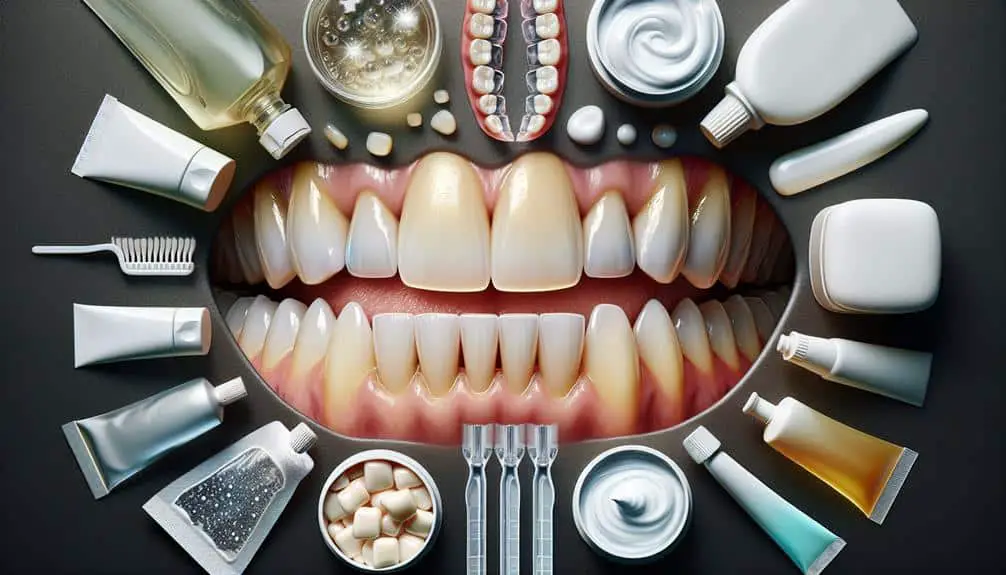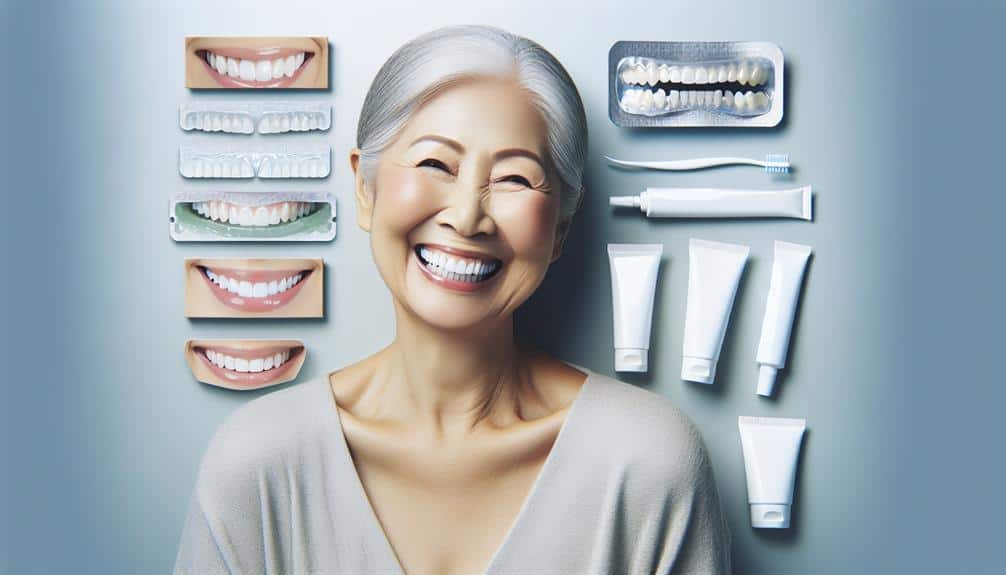If you're looking for safe whitening methods for mature teeth, consider professional dental options like laser treatments or home kits. Consult with your dentist to determine the best approach based on your oral health. For natural remedies, try oil pulling with coconut oil or using baking soda paste. Non-peroxide products and those designed for sensitive aging teeth are gentle alternatives. Finally, maintain your results with good oral hygiene practices and regular dental check-ups. Explore these options to achieve a brighter smile and healthier teeth.
Key Points
- Consult a dentist for personalized advice on safe whitening methods.
- Opt for professional treatments or non-peroxide alternatives for mature teeth.
- Use desensitizing toothpaste to minimize sensitivity during whitening.
- Follow recommended guidelines to prevent over-whitening and discomfort.
- Maintain results with proper oral hygiene and regular dental check-ups.
Professional Dental Whitening Options
When considering professional dental whitening options, consulting with your dentist is essential to determine the most suitable treatment for your mature teeth. In-office treatments and home kits are two primary avenues for achieving whiter teeth. In-office treatments often involve advanced procedures like laser whitening, where a specialized light activates the whitening agent to brighten your teeth quickly and efficiently. On the other hand, home kits typically consist of tray systems that you can use at your convenience. Your dentist may recommend a specific treatment based on the level of discoloration of your teeth and your overall oral health.
Laser whitening is a popular choice for those seeking immediate results, as it can noticeably whiten teeth in just one session. However, tray systems from home kits offer the convenience of gradual whitening over multiple uses. Both methods have been proven effective, but it's important to follow your dentist's guidance to ensure the safest and most suitable whitening option for your mature teeth.
Natural Whitening Remedies for Seniors
For seniors looking to explore natural whitening remedies, options abound that can gently brighten mature teeth without the need for professional treatments. Here are some effective and safe methods you can try:
- Oil Pulling: Swishing coconut oil in your mouth may help reduce bacteria and whiten teeth.
- Baking Soda Paste: Mixing baking soda with water to form a paste can gently scrub away surface stains.
- Strawberries: The malic acid in strawberries can help whiten teeth naturally when mashed and applied.
- Turmeric: Although it may seem counterintuitive due to its color, turmeric has whitening properties.
- Activated Charcoal: Brushing with activated charcoal may help remove surface stains, but caution is advised to use it sparingly to avoid enamel damage.
Remember to consult your dentist before trying any natural remedies to make sure they're safe for your teeth and gums. These herbal remedies and DIY techniques can be effective, but results may vary, and consistency is crucial to seeing improvements in the color of your teeth.
Non-Peroxide Whitening Products
Non-Peroxide whitening products offer a vital alternative for brightening teeth without the use of bleaching agents. These products often come in the form of gel alternatives that utilize ingredients like activated charcoal, baking soda, or hydrogen peroxide-free solutions to eliminate surface stains and enhance the whiteness of your teeth. While non-peroxide whitening products can be effective, it's important to think about protective measures to guarantee the safety of your mature teeth during the whitening process.
When using non-peroxide whitening products, it's critical to follow the instructions provided by the manufacturer carefully. Additionally, contemplate consulting with your dentist before starting any whitening regimen to assess the suitability of these products for your dental health. Protective measures such as using a desensitizing toothpaste, avoiding acidic foods and beverages, and maintaining good oral hygiene practices can help minimize sensitivity and potential damage to aging teeth while using non-peroxide whitening products. By incorporating these precautions, you can achieve a brighter smile without compromising the health of your mature teeth.
Considerations for Sensitive Aging Teeth
To guarantee the safety and health of your mature teeth, it's important to address considerations for sensitive aging teeth when exploring whitening options. As you age, your teeth may become more sensitive, requiring gentle techniques and specific sensitivity solutions for whitening. Here are some tips to help you navigate whitening with sensitive aging teeth:
- Consult Your Dentist: Before commencing any whitening treatment, consult your dentist to make certain it's suitable for your sensitive aging teeth.
- Use Desensitizing Toothpaste: Consider using desensitizing toothpaste for a few weeks before whitening to help minimize sensitivity.
- Choose Mild Whitening Products: Opt for whitening products specifically designed for sensitive teeth to reduce the risk of discomfort.
- Limit Whitening Frequency: Avoid over-whitening and follow recommended usage guidelines to prevent exacerbating sensitivity.
- Consider Professional Whitening: Professional whitening treatments performed by a dentist can be tailored to your specific needs, ensuring gentler whitening for sensitive aging teeth.
Maintenance Tips for Long-lasting Results
To maintain long-lasting whitening results for your sensitive aging teeth, incorporating proper oral hygiene practices is essential. Prevention techniques such as brushing your teeth at least twice a day with a fluoride toothpaste and flossing daily can help maintain the brightness of your smile. Additionally, using a whitening toothpaste once or twice a week can help remove surface stains, prolonging the effects of whitening treatments.
Vital benefits can also be achieved by avoiding foods and beverages that can stain your teeth, such as coffee, tea, and red wine. If you do consume these, consider using a straw to minimize contact with your teeth. Moreover, regular dental check-ups and professional cleanings are critical for maintaining your whitened teeth as they can address any underlying issues and prevent new stains from setting in.
Making positive lifestyle choices, such as quitting smoking, can't only benefit your overall health but also contribute to long-lasting whitening results. Remember, consistent oral health maintenance is key to preserving your radiant smile for years to come.
Frequently Asked Questions
Can Whitening Products Cause Damage to Older Teeth or Existing Dental Work?
When whitening products interact with older teeth or existing dental work, they can potentially cause damage to the tooth enamel and increase sensitivity. It's important to consult with a dentist to confirm the safest whitening methods for mature teeth.
Are There Any Specific Whitening Methods That Are Recommended for Individuals With Sensitive Gums or Oral Health Issues?
For sensitive gums or oral health concerns, consider sensitivity management alongside whitening options. Techniques like gentle whitening toothpaste or professional treatments tailored for gum health can be recommended by your dentist for effective results.
How Long Do the Results of Professional Dental Whitening Typically Last on Mature Teeth?
To keep your pearly whites shining like a lighthouse beacon, professional dental whitening on mature teeth usually lasts 6 months to 2 years. Maintain results with regular dental cleanings, using whitening toothpaste, and avoiding staining beverages.
Are There Any Dietary or Lifestyle Changes That Can Help Maintain Whitening Results for Seniors?
To maintain whitening results for seniors, focus on oral hygiene with regular brushing and flossing. A diet rich in fruits and vegetables can help prevent staining. Avoid habits like smoking and excessive coffee consumption for long-lasting whiter teeth.
Can Whitening Products Interfere With Certain Medications Commonly Taken by Older Adults?
When it comes to drug interactions and whitening products, tread carefully. Some medications commonly taken by older adults can clash with whitening agents. Prioritize safety and consult with your healthcare provider for guidance.
Conclusion
As the sun sets on your smile's journey towards brightness, remember that the safest whitening methods for mature teeth are like gentle waves, gradually bringing out the natural beauty within.
With professional options, natural remedies, and non-peroxide products, aging teeth can shine without harm. Consider your teeth's sensitivities and maintain their radiance with care.
Embrace the wisdom of age and let your smile illuminate the path ahead.



